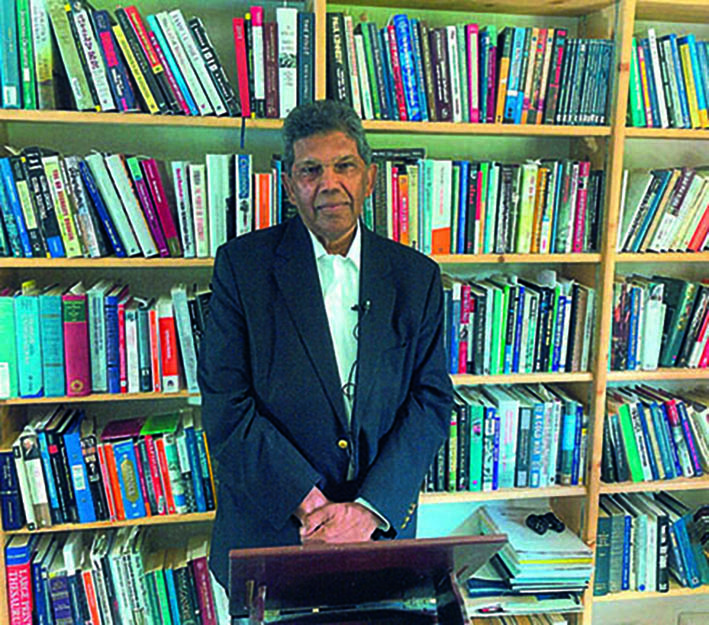By Dr Bertrand Ramcharan
Honorary Member of
the International
Commission of Jurists
The International Commission of Jurists, established in 1952, held its triennial congress in Geneva on Saturday 10 February, 2024. The congress, which this author attended as an Honorary Commis-sioner, provided important insights on challenges to democracy and the rule of law world-wide that are worth sharing widely. The insights below are based on the author’s impressions taken from reports presented to the congress.
Historically, the International Com-mission of Jurists has developed principles on the rule of law that have been of inestimable value over the years. In 1955, for example, the Commission adopted the ‘Act of Athens’, which solemnly declared that:
1. The State is subject to the law.
2. The Government should respect the rights of the individual under the Rule of Law and provide effective means for their enforcement.
3. Judges should be guided by the Rule of Law, protect and enforce without fear or favour, and resist any encroachments by governments political parties on their independence as judges.
4. Lawyers of the world should preserve the independence of their profession, assert the rights of the individual under the Rule of Law and insist that every accused is accorded a fair trial.
The Congress, which was attended by Commissioners, Honorary Commission-ers, and representatives of regional sections world-wide, registered that the foregoing principles on democracy and the rule of law are under severe stress in many parts of the world, and are in need of being supplemented and modernized in the light of contemporary challenges.
The world, it was pointed out, is changing politically, and the number of undemocratic governments is rising. Leading powers are challenging long-held precepts of human rights – and indeed the very notion that there are universally-valid human rights is under challenge.
Climate change, pandemics, wide-spread poverty and criminality are challenging the functioning of governments as well as of the administration of justice. And Artificial Intelligence (AI) is presenting opportunities as well as challenges to governance and the administration of justice that are still not well understood. There was an oft-repeated view that the ICJ should urgently study the implications of AI for the Rule of Law.
The independence and impartiality of judges, it was reported, have come under attack in many countries of the world. Interference is coming from outside as well as inside the judiciary. Systems for the appointment of judges are biased in some countries, and, in one instance, the President of the country is Head of the Judicial Council that appoints judges.
Some of the interference with the independence of judges is also coming from inside the judiciary through, for example, high-handedness on the part of the Chief Justice in the allocation of cases. In some countries, the judiciary is weaponised and used as an instrument of oppression.
Judges are politically controlled and harassed in many countries. In one country, no one charged has been acquitted over the past ten years. In many countries, disciplinary procedures applicable to judges are opaque and arbitrary. In some countries, standards on the accountability of judges are vague or non-existent.
In some countries, candidates for judicial appointment recommended by judicial commission are not appointed, for political reasons. In some countries, judges are appointed on a contractual basis, meaning that they have to be mindful of the renewal of their contracts. In some instances, where foreign nationals are appointed on a contractual basis, their visas may not be renewed and this can be used as leverage over them.
Problems are acute in countries emerging from conflict – where the standards for appointment and conduct of judges can be quite problematic. The judges in such transitional countries can be in quite a precarious situation.
In many countries there are prolonged delays in starting trials, and prosecutors press for pre-trial detention without bail. In many countries, women’s access to justice is highly problematic, and some judges prefer not to have to deal with cases involving LGBTQI issues. In many countries, the judiciary is not representative of the diversity of the population and in numerous countries men outnumber women on the bench.
The problems affecting democracy and the rule of law in one continent were presented as follows:
1. A decline of democracy and the rule of law.
2. Corruption in the administration of justice.
3. Organized crime affecting the administration of justice.
4. Scarcity of resources for the administration of justice.
5. Minimal education and training for judges.
6. Inadequate procedures for the selection of judges.
7. Arbitrary disciplinary procedures.
8. Lack of awareness about the ethical use of AI in the administration of justice.
Three important recommendations were offered by this contributor:
1. The International Commission of Jurists should urgently study the issue of political assaults on the judiciary, including from the inside.
2. The International Commission of Jurists should urgently update the international standards on the independence of the judiciary.
3. The International Commission of Jurists should urgently undertake a study on the ethical use of Artificial Intelligence by the judiciary.
4. The available standards on the independence of the judiciary should be widely disseminated, using modern communications technology.
The point was made repeatedly that democracy and the rule of law are under attack in all regions of the world and that the International Commission of Jurists should mobilize to defend them. As it was put by one speaker: “We can no longer take democracy, the rule of law and respect for human rights for granted.”






